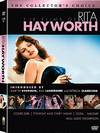





Teresa Wright
Biography | Filmography | Awards | Articles | Remembering | Bibliography | Gallery | News | Downloads | Links | Image Credits | THE LITTLE FOXES | MRS. MINIVER | SHADOW OF A DOUBT | THE PRIDE OF THE YANKEES | THE BEST YEARS OF OUR LIVES
| Article: |
Return of Teresa Wright Graces PBSby Kenneth R. ClarkThe Chicago Tribune October 8, 1987 page 19It took a dedication to public broadcasting, author Katherine Anne Porterand, and the story of a little girl's obsession with death to bring Teresa Wright back to television. Despite a general discomfort with most of what the medium has to offer these days, she will open the fall season of PBS' "Wonderworks" Sunday (4 p.m., WTTW-Ch. 11) as a stern Victorian grandmother who wears propriety the way an oak tree wears its bark. It is a role moviegoers of four decades ago never would have expected from the fragile beauty who co-starred with Bette Davis in "The Little Foxes," Gary Cooper in "Pride of the Yankees" and Greer Garson in "Mrs. Miniver," for which she won an Oscar as best supporting actress. But her beauty and her craft have only seasoned with age. "I'm always impressed when it's PBS and a 'Wonderworks' series," she said. "When they asked me to do this, I got the short story and read it, and when I read the script I really felt the screenwriter had captured it completely. The photography is pure artistry. It looks like an old English print." "Old English" may be the best description of "The Fig Tree," which Wright said incorporates themes from several of Porter's "Southwest" writings into the title story. The year is 1903 and, at the age of 9, Miranda (Karron Graves) walks with death. Her mother has died shortly after her birth and though she cannot remember her, she pays long and frequent visits to her grave and, in a secret grove, keeps a cemetery of her own in which she buries birds and animals that have perished in the harsh Texas environment. Her obsession peaks when, after interring a dead chick, she hears a weeping sound and fears she has buried the creature alive. Before she can dig it up, her father (William Converse-Roberts) whisks her away on a trip to the family's farm, ignoring her plea that she be allowed to return. As Miranda's grandmother, Wright is both bewildered and vexed by the child's growing depression and alienation from her siblings, but it is her eccentric sister (Doris Roberts), with whom she constantly and comically feuds, who finally finds the key that releases the child. Wright, a firm believer that television should enlighten as well as entertain, said if "divorce" is substituted for "death," the story has a modern application. "If a child is taken away from a parent in divorce, it's the worst thing in the world for the other parent to try to keep the child away from the one that's gone because the child is going to fantasize that parent into somebody very special," she said. "Children will fantasize what the missing parent might have done for them. If the parent they're living with disciplines, they will fantasize that the father or the mother who is gone probably would have saved them from that spanking or that lecture. "I think they tend to make missing parents into fairy godmothers or godfathers. If they get to know them, they know them as human beings with good points and bad points. Divorce, unfortunately, is happening more and more when children are young. I hope most parents are smart enough to realize that it's important to the child to have both parents." Wright's role in "The Fig Tree" marks a rare foray back into high profile acting. A few years ago, she won an Emmy for her portrayal of Anne Sullivan in "The Miracle Worker," but neither movies nor television projects hold great interest for her. "I think the emotional involvement then was greater," she said of movies made in the 1940s when she was a star. "The best movies today are very good, but I don't think there are as many of them. Sometimes the old ones don't stand up. They seem a little too sweet, too naive, too uncomplicated, but today, some of them are so convoluted that you don't know what it's all about and they don't know what it's all about. You think, 'How did this movie ever get made-and why?' "As for television, if all our children ever see are car crashes and sitcoms and exotic, neurotic stories, they'll be the losers. If you get nothing but a solid diet of the supernatural, the weird and the against-the-norm, pretty soon the norm is what seems weird." Wright does admit that she is a prime-time fan of "A Day in the Life," "Cagney & Lacey" and "The Golden Girls," but she deemed a television series of her own "not too likely." "It isn't too likely that they'd make a series about a real character I could play without pots exploding around them on the kitchen stove," she said with a laugh. "I'm not interested in playing a scene with pots." © 1987 The Chicago Tribune |
|
Return to the Index
of Articles. |
| Now in Print! |
|---|
| Now on DVD! |
|---|
Buy Videos & DVDs |
|
Buy Movie Posters |
|
Buy Movie Posters |
|
Classic
Movie Merchandise |
|
![]() Printer-friendly version.
Printer-friendly version.
![]() Return
to the top.
Return
to the top.
Last updated:
March 10, 2011.
Reel Classics is a registered trademark of Reel Classics, L.L.C.
© 1997-2011 Reel Classics, L.L.C. All rights reserved. No
copyright is claimed on non-original or licensed material.
Terms of
Use.









